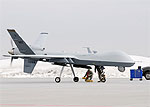Air Force increases combat air patrols for Reaper pilots
 The Air Force plans to increase the number of combat air patrols that MQ-9 Reaper pilots fly.
The Air Force plans to increase the number of combat air patrols that MQ-9 Reaper pilots fly.
The Air Force's fiscal 2016 budget would fund 60 MQ-9 combat air patrols in a 24-hour period, an increase from 55, said Air Force spokeswoman Vicki Stein. MQ-1 Predator pilots would be funded to fly five combat air patrols, for a total of 65 combat air patrols per day.
The Reaper is a newer unmanned aircraft that will eventually replace the Predator. The fiscal 2016 budget would add about 400 airmen to the MQ-9 community.
Each combat air patrol involves a varying number of aircraft and airmen, depending on the mission.
By raising the number of combat air patrols for Reapers, the Air Force is acknowledging that it cannot throttle back on the number of missions that remotely piloted aircraft pilots fly, said Peter Singer, of the New America Foundation think tank in Washington, D.C.
"It is to officially recognize the need to meet the continuing huge demands for CAPs [combat air patrols], which will allow the system to better plan for it in staffing, assignments, budgets etc.," Singer said in a Feb. 2 email to Air Force Times. "There was a push by some to reduce these numbers and 'return to normal.' This is a recognition by better minds that this is the new normal."
The RPA community as a whole is under severe strain because the Air Force does not have enough pilots for unmanned aircraft, and the service is losing more RPA pilots than it can train. The manpower shortage will become more acute as the first pilots trained solely to fly unmanned aircraft near the end of their active-duty service commitments.
A requirement for 65 combat air patrols would be crushing for RPA pilots, who work long hours, don't get much leave and have no time for professional military education, harming their careers, said an RPA pilot, who asked not to be identified.
"This is part of why everyone is so unhappy," the pilot told Air Force Times on Monday. "It's like when your engine temperature gauge is running just below the red area on your cars dashboard, but instead of slowing down and relieving the stress on the engine, you put the pedal to the floor. You are sacrificing the engine to get a short burst of speed with no real consideration to the damage being caused."
One year ago, Defense Secretary Chuck Hagel announced that the number of combat air patrols that RPA pilots fly was going down.
"Instead of increasing to a force of 65 around-the-clock combat air patrols of Predator and Reaper aircraft, the Air Force will grow to 55, still a significant increase," Hagel said on Feb. 24, 2014. "Given the continued drawdown in Afghanistan, this level of coverage will be sufficient to meet our requirements, and we would still be able to surge to an unprecedented 71 combat air patrols under the plan."
But that plan got scrapped when the U.S. launched an air war against the Islamic State group in Syria and Iraq later that year.
The stress on the RPA community has become so great that the head of Air Combat Command wrote a memo to Chief of Staff Gen. Mark Welsh saying that RPA pilots were straining to fly all the missions being asked of them, The Daily Beast reported on Jan. 4.
"We thought we were drawing down and had a plan in place to man this enterprise that would, if we had actually drawn down, we'd be fine right now," Welsh said at a Jan. 15 news conference.